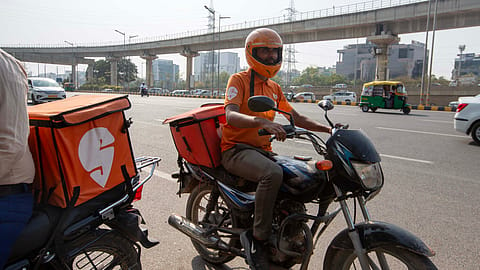Swiggy bets big on quick commerce; expands Instamart to 100 cities
Swiggy Instamart's expansion comes amid growing demand for 10-minute deliveries, particularly in tier-2 and -3 cities.

Quick commerce platform Swiggy Instamart announced its expansion to 100 cities nationwide today. This milestone comes amid growing demand for 10-minute deliveries, particularly in tier-2 and -3 cities.
Over the last month, Swiggy Instamart launched in cities such as Raipur, Siliguri, Jodhpur, and Thanjavur, bringing the convenience of quick commerce to many for the first time.
This comes as Swiggy Instamart faced stiff competition from Zomato's Blinkit and Zepto in quick commerce in the past 3-4 years and hasn't been able to maintain its early-mover advantage, according to HSBC. In the first half of 2025, Swiggy was 75% of Zomato in food delivery and 55% of Blinkit (owned by Zomato) in quick commerce in terms of gross order value (GOV). Profitability is also lagging in both businesses, said HSBC.
With this expansion, customers now have access to over 30,000 products, from groceries and daily essentials to electronics, smartphones, fashion, makeup, toys, and more—all delivered in 10 minutes, Swiggy said.
“Over the past year, millions of Indians have turned to Swiggy Instamart for everything from groceries and essentials to festive and everyday needs. We have noted that there is significant traction for convenience-led retail much beyond Indian metros, as both consumer behaviour and the value-proposition of quick-commerce evolve in tandem. Our expansion to 100 cities strengthens our reach and allows us to better serve growing consumer needs in underserved geographies,” said Amitesh Jha, CEO of Swiggy Instamart.
“In 2025, one in four new users came from tier 2 or 3 cities, underscoring the growing demand for quick commerce. With this growth, we’re excited to bring the same level of convenience, choice, and value to a much wider base of customers,” said Jha.
With the cricket and festive seasons, Swiggy Instamart is expanding its darkstore network by introducing 'megapods'. These megapods, ranging from 10,000 to 12,000 square feet in size, can house up to 50,000 stock-keeping units (SKUs), giving consumers access to three times the range of products available from a normal dark store.
Recommended Stories
“The expanded assortment opens up non-grocery categories but also enhances grocery selection available on the platform. This includes a mix of FMCG (fast moving consumer goods) and D2C (direct-to-consumer) brands, as well as local brands tailored to the unique preferences of customers in each city,” the company said.
The quick commerce platform, in its tier 2 and tier 3 city trends of 2025, said the highest single-day spend so far was worth ₹69,993 by a user in Thiruvananthapuram.
The highest total spent by a single-user has reached ₹3.34 lakh made by a customer in Dehradun. Top-selling categories in tier 2 and 3 cities include fruits & vegetables, followed by munchies & snacks and dairy, bread, and eggs. Onions top the list of most ordered items in smaller towns, followed by tomatoes and coriander. Patna became the fastest city to reach 1,000-plus daily orders, achieving the milestone just four days after launch.
Sriharsha Majety co-founder, managing director and Group CEO Swiggy, recently said the company’s growing quick commerce network of 609 dark stores has expanded to cover 44 cities as of September 2024. “Over the past year, we have pivoted our network to larger and more optimised dark stores which now house nearly 3x the SKUs. We are increasing our store counts as well, and added 52 stores in Q2,” said Majety. The Swiggy co-founder and MD said the company plans to double its store count by March 2025, while increasing the average size of its stores by 30-35%.
(INR CR)